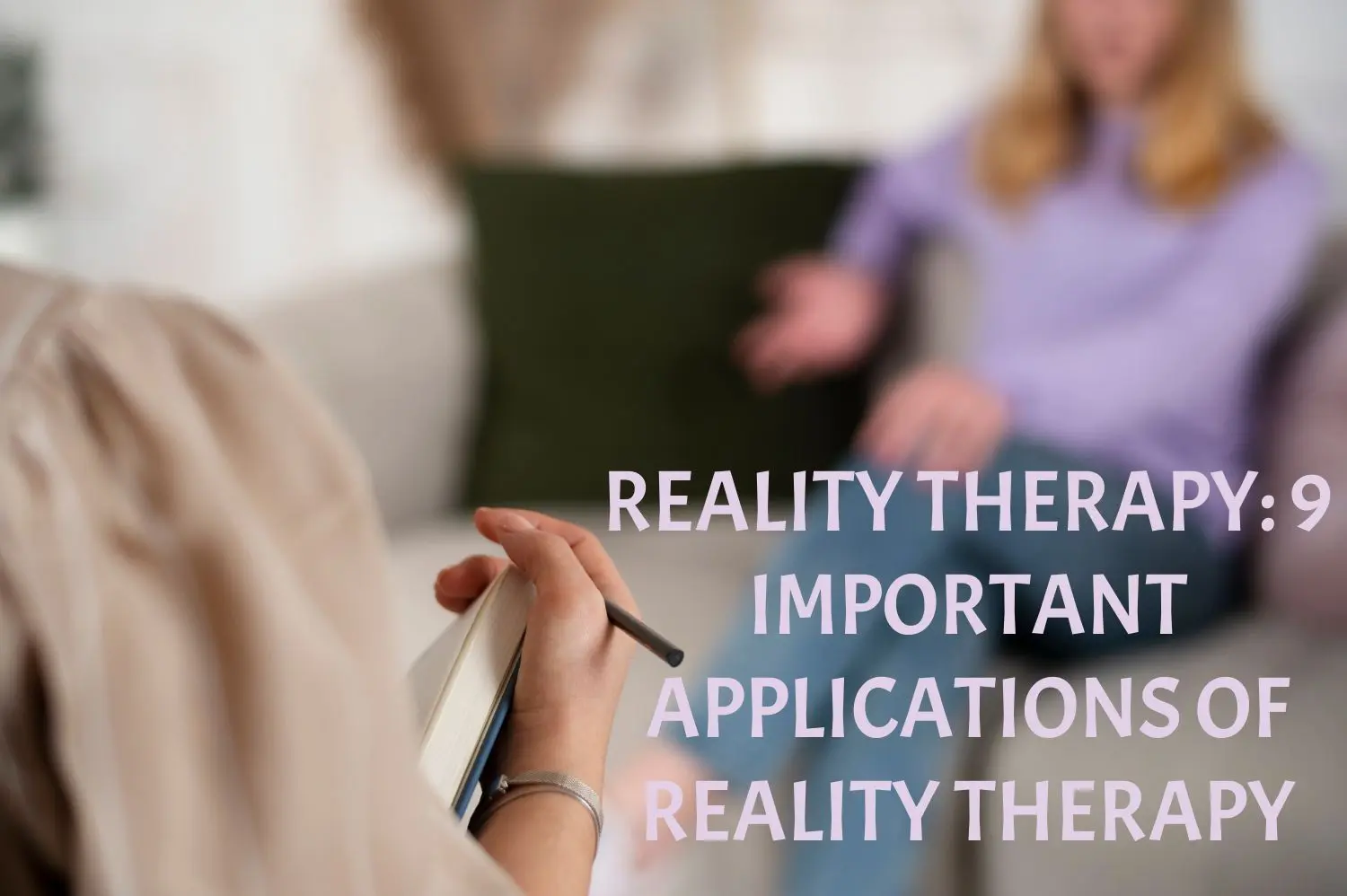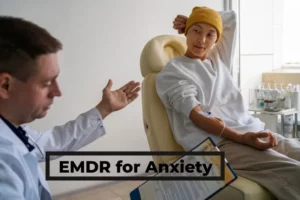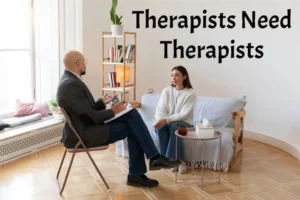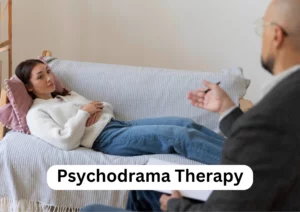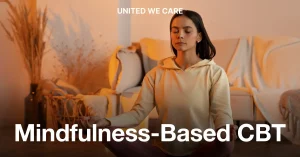Introduction
Reality therapy is present-focused talk therapy that helps clients make effective choices. Firstly, it is based on choice theory, which is the idea that humans have five basic needs. When those needs for love, freedom, power, fun, and survival go unmet, psychological problems start to develop. Reality therapy aims to help clients satisfy their needs in healthy and relationship-enhancing ways. Let’s learn more about it.
What is Reality Therapy
Feeling stuck? Reality therapy offers a path forward. This cognitive-behavioral approach stays focused on the present and less time is spent processing the past. The goal is to improve current relationships and life circumstances.
Reality therapy is based on choice theory. We have five basic needs – survival, love, power, freedom, and fun and when any of these needs go unmet, problems arise. Reality therapy helps identify your unfulfilled needs and with compassionate guidance, you make concrete plans to meet those needs in a healthy way. Your therapist supports you in setting empowering goals by emphasising on accountability and commitment. The therapist helps you to realise that the power to change lies within you.
Beliefs Behind Reality Therapy
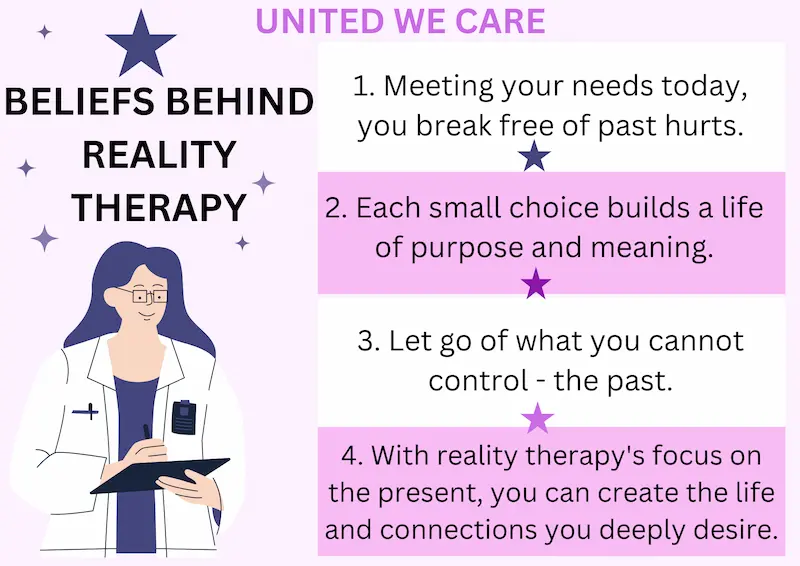
Reality therapy was created by William Glasser in 1965. It assists diverse clients – students, prisoners, hospital patients, and those with addictions.
The beliefs behind reality therapy are
- Meeting your needs today, you break free of past hurts.
- Each small choice builds a life of purpose and meaning.
- Let go of what you cannot control – the past.
- With reality therapy’s focus on the present, you can create the life and connections you deeply desire.
Virtual Reality Therapy
Immersive technology now expands therapy’s potential. Virtual reality therapy (VRT) uses headsets, headphones, and controllers to simulate real-world environments. This allows for safe yet transformative practice.
In the virtual space, you can confront fears previously avoided. Anxiety and phobia triggers become more manageable through gradual exposure. For trauma survivors, VRT offers opportunities to reprocess painful memories.
The therapist customizes each virtual environment to target specific treatment goals. Real-time feedback helps integrate insights. VRT has proven effective for conditions like anxiety, PTSD, depression, eating disorders, addiction, and chronic pain.
By enhancing traditional cognitive behavioral therapy, virtual reality can motivate and empower. Avoidance diminishes as you build confidence facing once-distressing stimuli. Through practice, emotional regulation strengthens. VRT’s immersive nature fosters growth.
When ready, exit the digital realm equipped for real-world challenges. What was once overwhelming felt manageable after facing fears head-on, even virtually. VRT can unlock courage you didn’t know you had.
Why Do You Need Reality Therapy
Individuals who usually feel unsatisfied with their relationships or choices, Reality therapy offers really present-focused practical solutions for them.
- If you want to improve your current situation, this approach may help. If you struggle with unfulfilled needs for connection, freedom, or purpose, reality therapy identifies new ways to meet those needs constructively.
- Perhaps you have trouble taking responsibility for behaviors that undermine you, but reality therapy helps build self-agency and accountability from within.
- Reality therapy, as a solution-focused approach, also complements other treatments for conditions like anxiety, depression, or addiction.
- Furthermore, to explore your options, you can take a look at the help provided by United We Care just as you would like it.
- Reality therapy helps a person let go of the stories that disempower them.
- So basically, reality therapy helps people figure out what really matters to them and make choices that line up with those values.
- It’s all about finding your true path, focusing on who you want to be, not who you’ve been in the past.
- With a bit of dedication and kindness to yourself, you can use this approach to make some real, long-lasting changes in your life.
- It’s like having a roadmap to shake off the feeling of being stuck and start living the life that truly satisfies you.
Virtual Reality Therapy CBT
Virtual reality therapy is a total game-changer! It combines cutting-edge VR tech with proven cognitive behavioral techniques, creating an immersive experience that’s incredibly effective. Picture putting on a headset and being transported to customized environments tailored to your needs. It’s like facing your fears in a safe, virtual world where you can practice and grow without real-world consequences.
But VR CBT isn’t just about exposure; it’s a holistic approach that includes relaxation training and rewiring your thought patterns. The result? Major anxiety relief. With guided practice, you can tackle situations that used to feel insurmountable, whether it’s social anxiety, phobias, PTSD, or more. And the best part? The benefits stick around. Over time, your symptoms decrease, and your confidence in real-life situations grows.
It’s like technology lending a helping hand in your healing journey, providing support to develop new coping skills and uncover meaning beyond anxiety. Virtual reality truly expands your horizons, opening up a world of possibilities for growth and transformation.
VR for Psychotherapy
Virtual reality has the potential to revolutionise therapy and help people make significant life changes. This cutting-edge technology can enhance various therapeutic approaches, from cognitive behavioural therapy to mindfulness and positive psychology. The use of VR in psychotherapy offers some exciting benefits that can greatly enhance the therapeutic process.
One of the coolest things about VR is its ability to create immersive environments where individuals can have intense emotional experiences. Practising skills in these realistic scenarios can feel much more effective. Plus, VR makes therapy sessions way more engaging, which can boost motivation and participation.
VR also eliminates barriers like geography and location, allowing people to participate in therapy from the comfort of their own homes. This can reduce stigma and ethical concerns, especially when using avatar therapists. The applications of VR therapy are incredibly vast—you can use it for relaxation, meditation, social skills training, and so much more.
While still relatively new, VR psychotherapy has the potential to overcome many limitations of traditional in-person treatment. However, it’s important to remember that human connection remains crucial. Combining high-tech VR with compassionate counsellors could lead to profound advancements in healing in the future.
Conclusion
When it comes to therapy, you’ve got the classic approach and the tech-savvy one, both helping folks make positive changes but in different ways.
So, with traditional therapy like reality therapy, it’s all about the present. No need to dwell on the past; it’s about making choices that fit your needs and improve your relationships right now.
Then there’s virtual reality therapy, which throws you into these cool simulated worlds. It’s like facing your fears or practicing skills in a super realistic but safe space.
There are different types, like VR CBT, which mixes exposure with cognitive stuff. And VR can team up with other therapies too, like mindfulness. And get this: studies show it works wonders for anxiety, PTSD, depression, and more, helping folks feel better and function better.While the approaches differ, both reality therapy and virtual reality therapy aim to empower clients to drive change. Reality therapy promotes effective decision-making in the real world. And virtual reality provides transformative practice that clients can apply in everyday life.
The takeaway? Traditional and tech-based therapies both equip people with tools to thrive. There are options out there to suit different needs and goals. The key is finding the approach that resonates with each person. We at United We Care, we offer a variety of therapies with the best therapists possible as your well-being is our first priority.
References
- R. E. Wubbolding, J. Brickell, L. Imhof, et al., “Reality therapy: A global perspective,” International Journal for the Advancement of Counselling, vol. 26, no. 3, pp. 219-228, 2004.
- J. A. Bitter and J. M. Nicoll, “Initial investigation of a reality therapy model of clinical supervision,” *Journal of Counseling and Development, vol. 88, no. 4, pp. 483-489, 2010.
- M. A. Khodabakhshi Koolaee, A. Falsafinejad, and M. Akbari, “The effectiveness of reality therapy on happiness and self-esteem of female high school students,” Journal of Psychology and Clinical Psychiatry, vol. 7, no. 1, pp. 1-5, 2017.
- S. A. Al-Harthy, “Reality therapy: A new approach for the management of stress for women,” Journal of Education and Practice, vol. 6, no. 35, pp. 125-131, 2015.
- S. K. Singh and S. K. Srivastava, “Reality therapy: An effective intervention for children with learning disabilities,” Indian Journal of Health and Wellbeing, vol. 3, no. 2, pp. 517-519, 2012.

